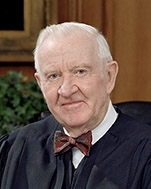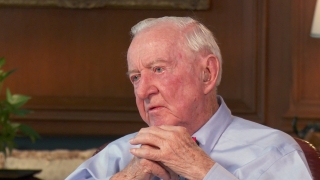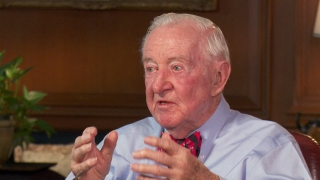Justice John Paul Stevens
Associate Justice, Supreme Court of the United States

Watch Part 1 of the full video, Part 2, and Part 3 or read the transcript (PDF: 1.61 MB).
Biography
John Paul Stevens (1920-2019), Associate Justice, Supreme Court of the United States, was born in Chicago, Illinois, April 20, 1920. He received an AB from the University of Chicago, and a JD from Northwestern University School of Law. He served in the United States Navy from 1942 to 1945, and was a law clerk to Justice Wiley Rutledge of the Supreme Court of the United States during the 1947 term. He was admitted to law practice in Illinois in 1949. He was associate counsel to the Subcommittee on the Study of Monopoly Power of the Judiciary Committee of the US House of Representatives from 1951 to 1952, and a member of the Attorney General’s National Committee to Study Antitrust Law, from 1953 to 1955. He was second vice president of the Chicago Bar Association in 1970. From 1970 to 1975, he served as a judge of the United States Court of Appeals for the Seventh Circuit. President Ford nominated him as an Associate Justice of the Supreme Court, and he took his seat December 19, 1975. Justice Stevens retired from the Supreme Court on June 29, 2010. He passed away on July 16, 2019 at 99 years, survived by two of his four children, 9 grandchildren, and 13 great grandchildren.
Video Excerpts
On whether statutes are floor or a ceiling
On stare decisis v. de novo
On what he considers his most important opinion
Related NYU Law Links
Former Justice John Paul Stevens reviews David Garland's new book
All rights in these oral history interviews belong to New York University. Quoting or excerpting of oral history interviews is permitted as long as the quotation or excerpt is limited to fair use as defined by law. Quotations and excerpts must cite and give proper credit to: IJA Oral History of Distinguished American Judges, Institute of Judicial Administration, NYU School of Law. For quotations or excerpts that exceed fair use, permission must be obtained from the Institute of Judicial Administration. Any permission granted will comply with agreements made with the interviewees and/or interviewers who participated in the oral history project. The transcript shall control over the video for any permitted use.






